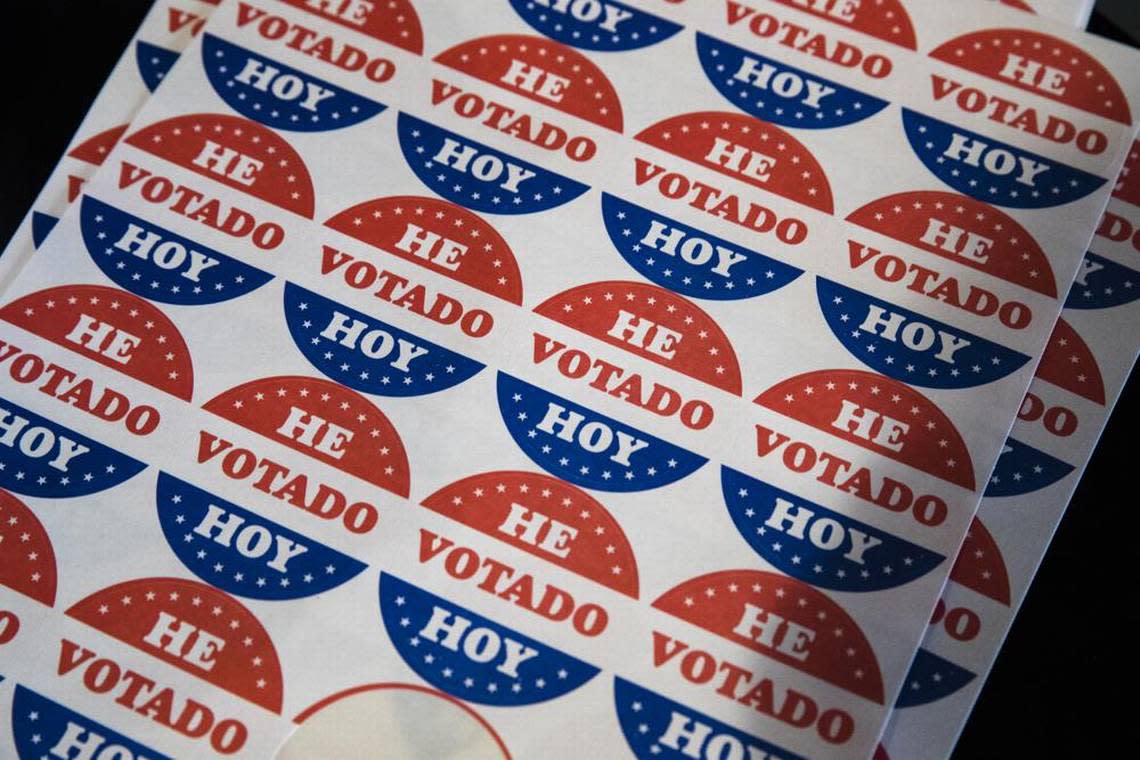Spanish misinformation: conservative talk radio and false narratives this election cycle
The latest on misinformation and disinformation on Spanish-language radio and social media this campaign season.
Good afternoon everyone!
It’s Lesley Cosme Torres again, here with the latest on Spanish-language disinformation in South Florida elections.
On Nov. 8. Jen Psaki, the press secretary to President Joe Biden, tweeted about how the Latino vote is not the same everywhere, “in Florida population of older voters (more likely Rs) much larger than younger. Socialism does not play there. And there is a massive disinformation problem in Spanish language media.”
This week I’m featuring a Miami Herald investigation that shows how in Miami, Spanish-language radio and social media platforms are filled with conservative voices and false narratives that added to misinformation this election season, the most talked about narratives on Spanish language media, and how Covid-19 misinformation is still an issue.
As always, If you read or hear anything you find misleading on Spanish-language radio or on social media via WhatsApp, Telegram, Facebook, or Twitter, email me.
Happy Friday! And enjoy your holiday season.

Does Spanish-language media in Miami spread misinformation?

As our Spanish-language misinformation project concludes, Andres Viglucci, Joey Flechas, and I wrote about how in Miami, on Spanish talk-radio and on the most popular social media platforms, conversations are dominated by GOP and conservative voices. Topics range from the border and immigration, to U.S. and Cuban relations, the COVID-19 pandemic, and equating Democrats to socialists.
“The whole thing about misinformation is, they want to attract attention. They want to be relevant,” said Tomás Regalado, a Spanish-language radio commentator and former Republican Miami mayor. He blamed misinformation on the influence of social media and relaxation of radio standards by operators and hosts. “They sound angry and they sound serious. And people take them at their word. I never in my 50 years on radio saw anything like this.”
Many of these false narratives come from hosts and influencers who tend to blur the lines between news and opinion.
The top narratives on Miami’s Spanish-language media this election cycle

In a recent article, I wrote about the most frequent talking points on Spanish-language radio and on social media platforms, according to a study and review by the Miami Herald, el Nuevo Herald and Florida International University. We found that the most popular talking points were outright misinformation. Out of dozens of shows and social media posts, these were the top 4:
▪ Voter fraud. Example: During a Nov. 9 YouTube live stream, host Alex Otaola cited what he called “voting irregularities” and played a video of former President Donald Trump claiming “a lot of bad things’‘ are happening in polling places across the country.
▪ Immigration. Example: Actualidad’s afternoon program host Agustín Acosta repeated assertions published by conservative outlet Breitbart that claimed the Venezuelan government was emptying its prisons and pushing inmates north to the U.S.-Mexico border.
▪ Political extremism. Example: After Republican U.S. Sen. Marco Rubio tweeted to his 4.4 million Twitter followers that GOP canvasser Christopher Monzon had been beaten at the hands of “4 animals who told him Republicans weren’t allowed in their neighborhood” in Hialeah, some hosts ran with the claim that Democrats were responsible for the incident.
▪ Covid-19 misinformation. Example: Near Election Day, Verdades Ofenden, a popular Spanish-language group known for spreading false theories on Telegram, posted a Daily Mail article claiming that researchers at Boston University created a new, deadlier COVID virus strain in their lab that killed 80% of mice. Boston University stated that the Daily Mail article was false, inaccurate and misrepresented what the researchers actually found.
COVID-19 misinformation is still a lingering issue

Recently released statistics show thousands of “excess” deaths in U.S states and counties with the lowest uptake of Covid-19 vaccines, though the shots were free and available for all, according to Faye Flam, Bloomberg opinion reporter covering science. The low vaccination rates can be attributed to the public remaining skeptical of Covid vaccines, Flam wrote. Among the misinformation narratives are a distrust in mRNA technology, which has been in development for decades; false theories that vaccines change your DNA, cause infertility, or even kill you. None of these are true.
One of the most widely circulated misinformation narratives, specifically in the Hispanic community, is about infertility. False claims that Covid-19 vaccines cause infertility are based on real reports that some women observed temporary changes in their menstrual cycle.
“Both kinds of fear can be debunked with data. For example, if vaccines were killing people, excess mortality would be concentrated in the most vaccinated regions, and should show a spike after the peak of the 2021 vaccination campaign, when 3 million people a day were getting shots,” Flam wrote. “Instead, the data show excess deaths concentrated in the least vaccinated areas, and during times when Covid cases were high — not when the vaccination rate was high.”
This newsletter is part of a project on misinformation in Spanish-language media by the Miami Herald, el Nuevo Herald and researchers at Florida International University. It is funded by Journalism Funding Partners, which received support from the Knight Disinformation Fund at The Miami Foundation. The Miami Herald retains editorial control of the content..
